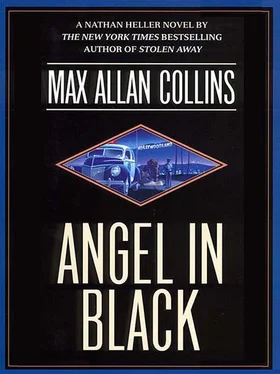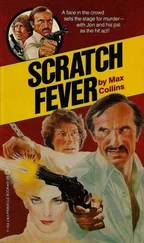Max Collins - Angel in black
Здесь есть возможность читать онлайн «Max Collins - Angel in black» весь текст электронной книги совершенно бесплатно (целиком полную версию без сокращений). В некоторых случаях можно слушать аудио, скачать через торрент в формате fb2 и присутствует краткое содержание. Жанр: Криминальный детектив, на английском языке. Описание произведения, (предисловие) а так же отзывы посетителей доступны на портале библиотеки ЛибКат.
- Название:Angel in black
- Автор:
- Жанр:
- Год:неизвестен
- ISBN:нет данных
- Рейтинг книги:4 / 5. Голосов: 1
-
Избранное:Добавить в избранное
- Отзывы:
-
Ваша оценка:
- 80
- 1
- 2
- 3
- 4
- 5
Angel in black: краткое содержание, описание и аннотация
Предлагаем к чтению аннотацию, описание, краткое содержание или предисловие (зависит от того, что написал сам автор книги «Angel in black»). Если вы не нашли необходимую информацию о книге — напишите в комментариях, мы постараемся отыскать её.
Angel in black — читать онлайн бесплатно полную книгу (весь текст) целиком
Ниже представлен текст книги, разбитый по страницам. Система сохранения места последней прочитанной страницы, позволяет с удобством читать онлайн бесплатно книгу «Angel in black», без необходимости каждый раз заново искать на чём Вы остановились. Поставьте закладку, и сможете в любой момент перейти на страницу, на которой закончили чтение.
Интервал:
Закладка:
“You mean, a guy runs a red light, gets pulled over, and suddenly Jack the Ripper’s been arrested.”
“That’s how it usually happens,” the LAPD’s top homicide expert said. “But don’t quote me.”
Harry the Hat continued to work the Dahlia case, off and on, until he retired to Palm Desert, California, in 1968. He became known as the detective obsessed with the Dahlia, and was frequently quoted in newspaper “nostalgia” pieces; he consulted on a TV movie about the case. He died at age eighty, a stroke mercifully ending a battle with lung cancer. His three cabinet files of Dahlia evidence shifted from detective to detective at the LAPD over the years, including the legendary “Jigsaw John”-John St. John.
Harry and Finis Brown had a falling out, during the call-girl fiasco; but Brown-with the blessing of his beloved brother, Thad, the Chief of Detectives upon whom Raymond Burr based the Ironsides character-continued working the case on his own, and was said to be at least as obsessed with it as the Hat. He chased leads out of state-Florida, New York, and the Great Lakes region-before eventually retiring to Texas.
Brown did discover my connection to Elizabeth Short, and was heartbroken (I was told by an amused Hansen) when the Hat told Fat Ass that he already knew it, and had dismissed it. Brown, bookie or not, did have skills as a detective and on his Chicago trip tracked down the same Hammond, Indiana, abortion doctor that Lou Sapperstein had questioned for me.
In the months that became years following the discovery of Elizabeth Short’s body in that vacant lot, both Hansen and Brown and every other LAPD detective working the case was stymied by a succession of copycat kills, muddying the waters, naked dead women with “BD” carved in their thighs, killers hoping to pass the blame or perhaps claim it.
Robert “Red” Manley’s marriage did not last. Nor did his sanity-about a month after he was questioned, Manley suffered a nervous breakdown and received shock treatments at a private sanitarium. In 1954 his wife Harriet committed him to a state hospital, where he was diagnosed paranoid schizophrenic. They were divorced shortly after, and once, in the early ’70s-between stays at various psychiatric hospitals-Manley, living in a trailer, used an ax to chase away a researcher inquiring about the Black Dahlia. Manley eventually committed suicide.
Two years after the murder of Elizabeth Short, Mark Lansom was shot, nearly fatally, by one of his dance-hall girls. Photographs of Beth Short were found in Lansom’s possession by the police, though the exact nature of those photos remains undisclosed. Actress Jean Spangler, a former Florentine Gardens dancer who resembled Beth Short, disappeared in the fall of 1949; Lansom was a
suspect in what appeared to be a murder, but was not prosecuted. He died of natural causes in 1964.
Which was more than could be said for Nils T. Granlund. Granny, who finally exited the Florentine Gardens in 1948, took his showgirl-saturated showmanship to Las Vegas, where in 1957 he was hit by a taxicab in the Riviera parking lot, dying hours later of a fractured skull and internal injuries.
Dr. Wallace Dailey died of a heart attack in November of 1947. Dr. Maria Winter and Mrs. Wallace Dailey fought bitterly over the dispersal of the doctor’s estate, half of which (including his medical practice and equipment) had been left by Dailey to his female partner. The spurned wife claimed that his “feminine office partner” had been blackmailing the good doc, having learned certain damaging knowledge concerning Dr. Dailey’s “professional secrets,” keeping him a virtual prisoner during the last months of his life. The struggle was played out in the L.A. papers, and many assumed that the “professional secrets” referred to Dailey’s abortion mill; but I wondered if that cunning olive-skinned amazon had convinced the senile doctor he had indeed killed the Black Dahlia. In any event, the court rejected both their claims, appointing a trust to handle the estate.
Later in 1947, my friend Eliot Ness lost his bid for mayor in Cleveland. He was also voted down as chairman of the Diebold board, and efforts to gain another position in law enforcement never panned out. Quietly suffering with a worsening drinking problem, he remained in the private sector, where his business endeavors were less than stellar. His third marriage, however, was a happy one. In 1957, in the small town of Coudersport, Pennsylvania-where he was trying to make a go of a check-watermarking business-he died in his kitchen, having just returned from the liquor store, shortly after receiving in the mail the galley proofs of The Untouchables, the autobiography that would make him a posthumous household name, as the “man who got” Al Capone.
Capone, incidentally, died in January 1947, finally succumbing to syphilis-related ailments, sharing the front page with Black Dahlia coverage, about a week after I put Eliot Ness and Lloyd Watterson on the Union Pacific bound for a Dayton, Ohio, loony bin.
Which was where Lloyd Watterson died, far too peacefully for my tastes, in 1965. After Eliot’s death, I began receiving Lloyd’s taunting postcards-and it became my job to make sure the Mad Butcher of Kingsbury Run was still confined in that veterans hospital in Dayton.
Most of the Crazy House sequence was cut from Orson Welles’s Lady from Shanghai, a film Harry Cohn dumped into the second-tier slot of a double-feature release, further damaging the director’s already crippled Hollywood career. In May of ’47 Welles mounted his low-budget production of Macbeth, and in November he and Rita Hayworth were divorced. The next three years of his life were largely spent in Europe, filming Othello in fits and starts and bits and pieces, funded by acting jobs in other directors’ movies, Welles frequently playing a villain. This was to be the pattern for a larger-than-life life that ended quietly in October of 1985. The shadow of Elizabeth Short’s death casts itself over many of his later films, in particular Touch of Evil, in which director/cowriter Welles plays a villainous cop who strangles a victim in a seedy hotel room.
Richardson retired and eventually died; Fowley retired, wrote novels, and is still alive, at this writing. Hearst promoted Aggie Underwood to managing editor, to shut her up about the Bauerdorf killing. In 1949, Jack Dragna finally got somebody to hit Mickey Cohen, or try anyway, at Sherry’s restaurant, with Fred Rubinski and me nearby-but that’s another story. Barney and Cathy remarried, of course, very happily, Barney never needing the needle again. Barney lost a bout, to cancer, in 1967.
Most of the rest of them, cops and crooks, I lost track of over the years. A bail-bondsman named Milton Schaeffer sent his people after Savarino and Hassau and brought them back, from San Francisco, and they got sentenced to thirty years, not twenty. What happened to them after that, I have no idea. I always kind of hoped Savarino made it out on Good Behavior in, say, ten and picked back up with Patsy and their kid and went straight. But that is, of course, ridiculous Polly-fucking-anna thinking.
Peggy and me? We had our beautiful son-Nathan Samuel Heller, Jr.-on September 27, 1947. We had by that time moved to a brick bungalow in the Chicago suburb Lincolnwood, and she had already asked me for a divorce. We’d struck a truce, in those last few days at the Beverly Hills Hotel, and there had been no recriminations or accusations from either of us-we had even screwed each other silly, proclaiming our undying love and looking forward to the first of many babies. We didn’t quite make two years.
Our relationship, postmarriage, remained stormy. We almost got back together a couple times, and for patches we were friendly, and there were stretches where we weren’t. For a long time my son-who lived with his mom-believed all the terrible things she told him about me. When he got older, we started to get along better, but maybe if he reads this book, he’ll know his mother wasn’t perfect… and that without his dad, he might’ve ended up a few teaspoons of slippery, slimy cells floating in water in a metal basin.
Читать дальшеИнтервал:
Закладка:
Похожие книги на «Angel in black»
Представляем Вашему вниманию похожие книги на «Angel in black» списком для выбора. Мы отобрали схожую по названию и смыслу литературу в надежде предоставить читателям больше вариантов отыскать новые, интересные, ещё непрочитанные произведения.
Обсуждение, отзывы о книге «Angel in black» и просто собственные мнения читателей. Оставьте ваши комментарии, напишите, что Вы думаете о произведении, его смысле или главных героях. Укажите что конкретно понравилось, а что нет, и почему Вы так считаете.












